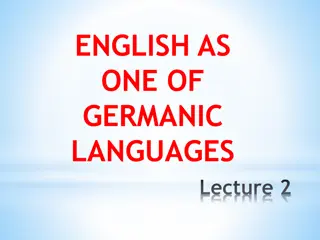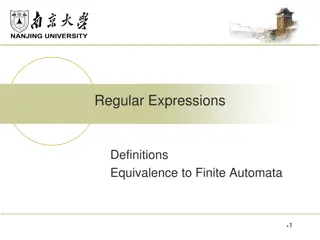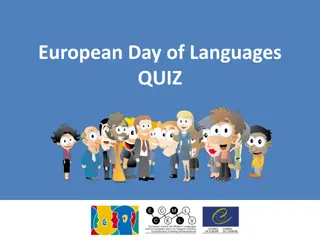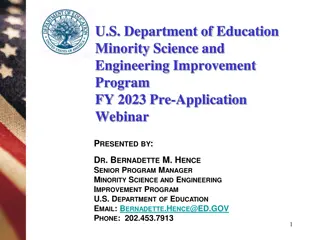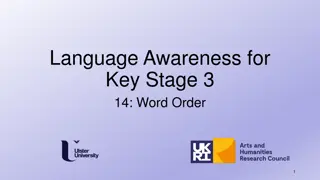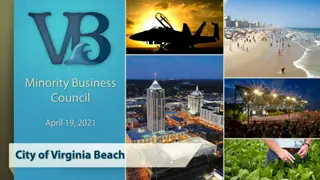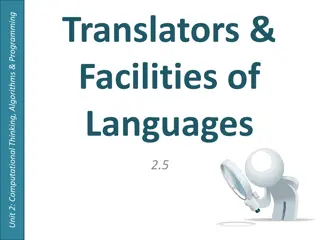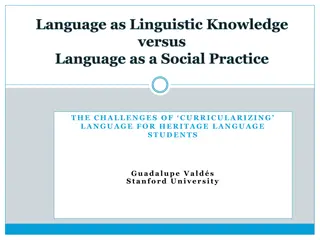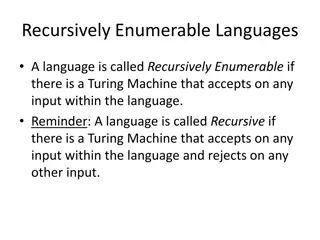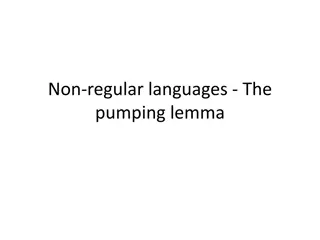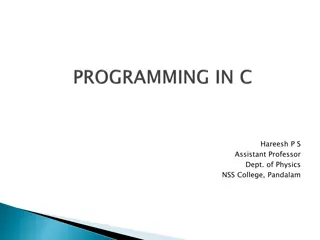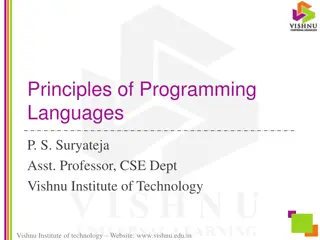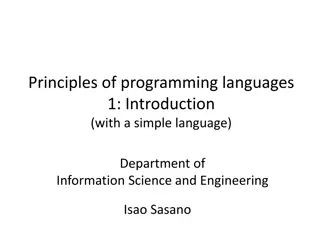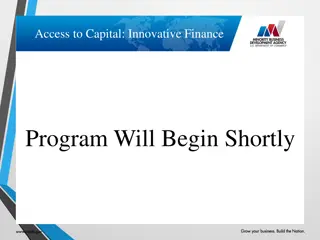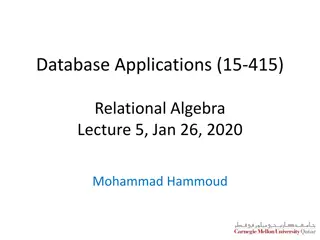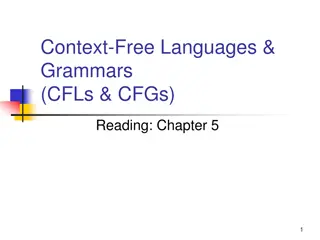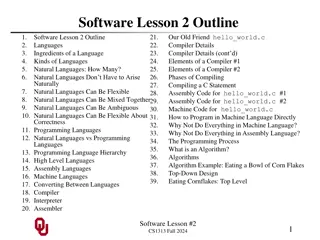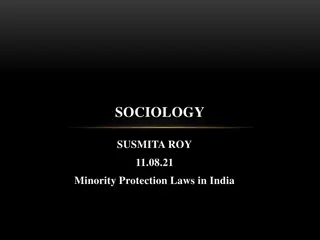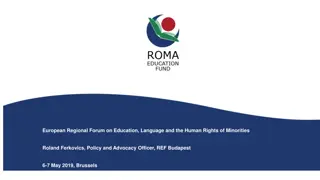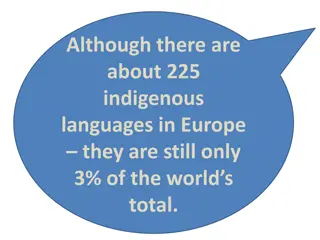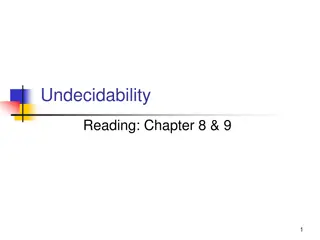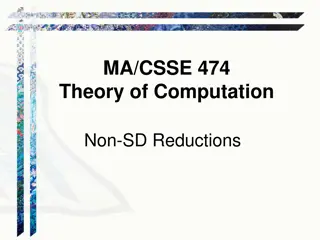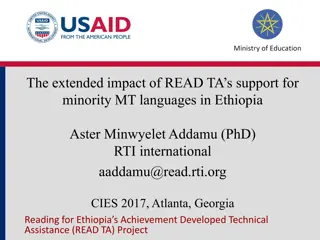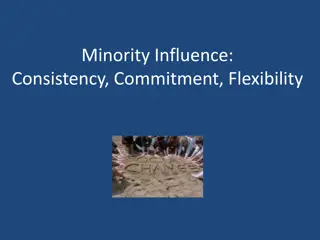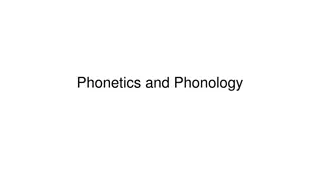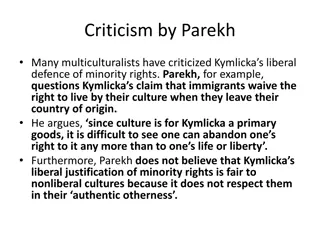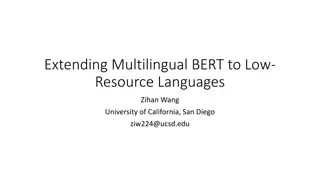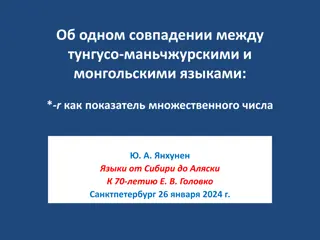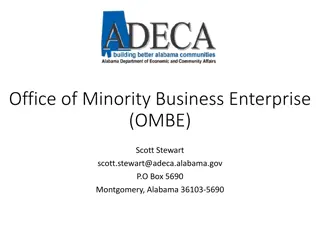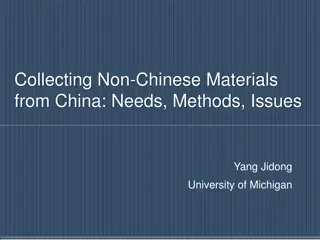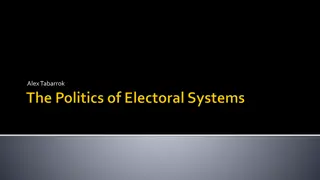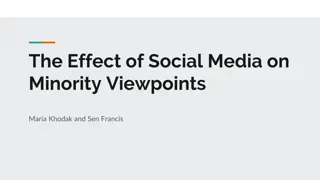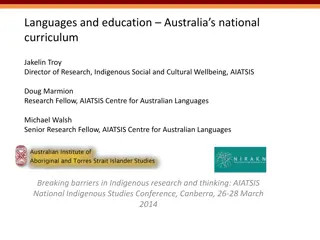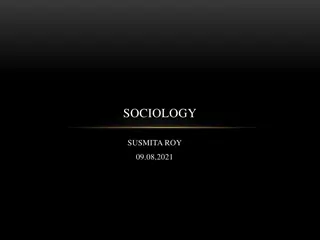Exploring Germanic Tribes and Languages in History
Delve into the ancient Germanic tribes and languages, their territories, movements during the Migration Period, surviving languages, writing systems, and encounters with prominent historical figures like Roman generals. Learn about the earliest mentions of Germans by Greek travelers and astronomers,
3 views • 35 slides
Introduction to Regular Expressions and Equivalence to Finite Automata
Regular expressions (REs) are used to describe languages by algebra and are equivalent to finite automata. They define regular languages precisely using operations like union, concatenation, and Kleene star. The concatenation of languages combines strings from two languages, while the Kleene star re
9 views • 106 slides
European Day of Languages QUIZ
Explore interesting facts about languages in the world through a quiz. Discover the number of living languages, the origins of written language, official languages like Azeri, and the history of sign languages. Test your knowledge on the European Day of Languages!
6 views • 24 slides
Minority Science and Engineering Improvement Program Overview
The U.S. Department of Education's Minority Science and Engineering Improvement Program for FY 2023 aims to provide information, technical assistance, and guidance to help understand the grant opportunity. The program's purpose is to enhance science and engineering education at minority institutions
0 views • 76 slides
Understanding Word Order in Different Languages
Explore the fascinating world of word order in languages. Discover how different languages arrange words in various ways, such as Subject-Verb-Object (SVO), Subject-Object-Verb (SOV), and more. Delve into the diversity of word orders for subjects, objects, and verbs, and uncover how language structu
2 views • 31 slides
Minority Business Council Advisory Agency Overview
The Minority Business Council (MBC) serves as an advisory agency to the City Manager and City Council regarding procurement policies for small, woman, service-disabled, and minority-owned businesses in Virginia Beach. The MBC's vision is to connect contractor resources with city opportunities, while
0 views • 11 slides
Understanding Programming Languages and Translators in Computational Thinking
Programming languages are categorized into generations, from low-level machine code to high-level languages. Translators like assemblers, compilers, and interpreters help convert code for computer execution. Each generation has its characteristics and purposes, affecting ease of programming, debuggi
1 views • 18 slides
Challenges of Curricularizing Language for Heritage Language Students
The field of Heritage Language Education has shown growth and importance in recent years, with a focus on teaching minority languages for various purposes. Researchers are studying heritage languages spoken around the world. Despite progress, there is a tension between common goals in HL education a
0 views • 47 slides
Understanding Recursive vs Recursively Enumerable Languages
Comparison between recursive and recursively enumerable languages in terms of Turing Machines acceptance, decidable languages, recognizable languages, and partial predicates. Explains the concepts with examples and how Turing Machines decide membership in languages.
0 views • 8 slides
Understanding Non-Regular Languages and the Pumping Lemma
Dive into the world of regular and non-regular languages, exploring the concept of the pumping lemma. Learn about different types of non-regular languages and why some languages require an infinite number of states to be represented by a finite automaton. Find out why mathematical proofs are essenti
0 views • 62 slides
High Commissioner on National Minorities (HCNM) Mandate and Activities
The High Commissioner on National Minorities (HCNM) was established in 1992 by the OSCE to prevent conflicts related to national minority issues. Through quiet diplomacy and early warning mechanisms, the HCNM works to identify and address ethnic tensions that could threaten peace and stability among
0 views • 8 slides
Overview of Grammar Types and Chomsky Hierarchy
The four types of grammars are General, Context-Sensitive, Context-Free, and Linear grammars, each recognizing a specific set of languages. Chomsky Hierarchy categorizes these grammars into four levels, indicating subsets of languages they can recognize. Context-free grammars have specific productio
0 views • 17 slides
Understanding Formal Semantics of Programming Languages: From Lambda Calculus to Separation Logic
Explore the foundational concepts of formal semantics in programming languages, covering Lambda Calculus, Untyped and Simply-typed languages, Imperative languages, Operational and Hoare logics, as well as Separation logic. Delve into syntax, reduction rules, typing rules, and operational semantics i
7 views • 14 slides
Understanding Programming Languages: Levels and Basics
Programming languages facilitate communication between humans and computers, with machine language being the fundamental binary code understood by computers. Different levels of programming languages exist, from low-level machine language to high-level languages like C. Natural languages are meant f
0 views • 35 slides
Principles of Programming Languages at Vishnu Institute of Technology
Introduction to Principles of Programming Languages course including prerequisites, objectives, outcomes, and syllabus at Vishnu Institute of Technology. The course covers key concepts, popular programming paradigms and languages, practical knowledge in lexical analysis and parsing, as well as writi
0 views • 43 slides
The Currency of Love: Importance of Communication and the 5 Languages of Love
Understanding the essence of love lies in effective communication and expressing love through the five languages - Words, Gifts, Actions, Time, and Physical Touching. Communication is depicted as the currency of love, essential for deepening bonds between partners. Gary Chapman's concept of the 5 La
4 views • 33 slides
Principles of Programming Languages: Introduction and Machine Language Overview
This material covers the basics of programming languages, including an introduction to a simple language, evaluation methods, and contact information for the instructor. It explains machine language, the native language of computers, and the transition to high-level programming languages. The benefi
0 views • 24 slides
Enhancing Minority Access to Capital through Innovative Finance Program
This program aims to address the challenges faced by minority-owned businesses in securing traditional business loans. It highlights issues such as barriers to demonstrating wealth, collateral requirements, and biases in credit scoring models. The initiative seeks to promote the growth of minority b
0 views • 16 slides
Understanding Relational Query Languages in Database Applications
In this lecture, Mohammad Hammoud discusses the importance of relational query languages (QLs) in manipulating and retrieving data in databases. He covers the strong formal foundation of QLs, their distinction from programming languages, and their effectiveness for accessing large datasets. The sess
0 views • 39 slides
Small Business Diversity Banking Program for Minority, Women, and Veteran Business Owners
Small Business Diversity Banking Program aims to empower minority, women, and veteran-owned businesses by providing access to loans and lines of credit. Eligible businesses include those with over 50% ownership or control by minority, women, or veteran U.S. citizens in California with annual revenue
10 views • 7 slides
Understanding Context-Free Languages and Grammars
Context-Free Languages and Grammars (CFLs & CFGs) are essential in theoretical computer science, providing a framework for recognizing non-regular languages. This content explores the distinction between regular and context-free languages, delves into the construction of language recognizers using c
0 views • 40 slides
Understanding Languages in Software Development
Exploring the fundamentals of languages in software development, this content covers natural languages, programming languages, and the components of a language like symbols, grammar, and semantics. It delves into the differences between natural and programming languages, highlighting the essential r
0 views • 39 slides
Minority Protection Laws in India: Safeguarding Diversity
India's rich diversity poses the need for robust laws to protect minority communities, ensuring their rights and safeguarding their customs. The Constitution of India upholds secularism and equality, providing provisions to safeguard minority rights and prevent discrimination based on religion, cast
1 views • 19 slides
Challenges Faced by Roma Language Education in Europe
The European Regional Forum on Education, Language, and the Human Rights of Minorities, led by Policy and Advocacy Officer Roland Ferkovics, addresses systematic and institutional barriers in Roma language education. Issues include deficiencies in state curricula, lack of teaching materials, absence
0 views • 8 slides
The Diversity of European Languages
Europe is home to a rich tapestry of languages, with over 225 indigenous languages spoken, making up only 3% of the world's total. Bilingualism is celebrated for its benefits, facilitating communication, enhancing cognitive abilities, and fostering cultural connections. Despite many languages having
0 views • 14 slides
Understanding Recursive and Recursively Enumerable Languages
Exploring the concepts of decidability and undecidability in computer science, specifically focusing on Recursive and Recursively Enumerable (RE) languages. Recursive languages always halt, while RE languages may or may not halt, showcasing the differences between decidable and undecidable problems.
0 views • 35 slides
Understanding Non-SD Languages in Theory of Computation
Explore the concept of Non-SD languages in the theory of computation, which are larger in number compared to SD languages. Non-SD languages involve infinite search or analyzing whether a Turing Machine will loop indefinitely. Discover examples and insights into proving languages are not SD through c
0 views • 38 slides
Supporting Minority Languages in Ethiopia: The Impact of READ TA Project
The READ TA Project in Ethiopia focuses on supporting minority languages to improve educational outcomes. With over 83 languages spoken in the country, the project aims to promote language equality and provide technical assistance for effective language policies, teacher training, and curriculum dev
0 views • 23 slides
Understanding Minority Influence: Consistency, Commitment, and Flexibility
Minority influence involves a small group of people persuading others to adopt their beliefs, attitudes, or behaviors, leading to internalization and social change. Consistency plays a vital role in exerting influence, as it encourages others to rethink their own views. Commitment, demonstrated by l
0 views • 15 slides
Understanding Phonology: The Study of Speech Sounds in Language
Phonology is a branch of linguistics that focuses on the organization and usage of speech sounds in natural languages, with phonemes being the smallest units of sound that carry meaning. This field explores the sound structure of languages, highlighting the variety of phonemes present across differe
0 views • 19 slides
Critiques of Multiculturalism by Parekh, Taylor, Barry, and Kymlicka
Many multiculturalists criticize Kymlicka's liberal defense of minority rights, questioning his views on immigrants and children of parents who emigrate. Parekh and Taylor argue against Kymlicka's approach to culture and minority rights, while Barry criticizes how multiculturalists use culture to de
0 views • 7 slides
Extending Multilingual BERT to Low-Resource Languages
This study focuses on extending Multilingual BERT to low-resource languages through cross-lingual zero-shot transfer. It addresses the challenges of limited annotations and the absence of language models for low-resource languages. By proposing methods for knowledge transfer and vocabulary accommoda
0 views • 21 slides
Comparative Study on Mongolic and Tungusic Languages
Explore the fascinating linguistics of Mongolic and Tungusic languages, delving into their historical sources, internal reconstruction, morphology, syntax, and class markers. Discover the parallels and differences between these language families, analyzing aspects such as sound systems, lexicon, and
0 views • 16 slides
Exploring Computer Programming Principles
Dive into the world of computer programming, covering high-level and machine languages, compilers, interpreters, writing programs, top-down design, and the array of programming languages available. Understand the essentials of building code to control computers, the diversity of programming language
0 views • 23 slides
Office of Minority Business Enterprise (OMBE) Overview
The Office of Minority Business Enterprise (OMBE) under Scott Stewart aims to support certified minority and woman-owned businesses, facilitating their participation in construction projects and accessing CDBG funds. The OMBE maintains a list of certified businesses, distributing bid notifications a
0 views • 11 slides
Diversity in Publications: Non-Chinese Materials in China
Exploring the rich linguistic and cultural diversity in China, this content delves into the collection of non-Chinese materials, multilingualism in China, studies on minority ethnic groups, and the overview of ethnic publications in the country. It highlights the importance of collecting ethnic publ
0 views • 6 slides
Electoral Systems and Minority Representation
Various electoral systems, including district and at-large voting, impact how minorities are represented in government. District systems can provide more proportional representation for minorities if they are geographically concentrated, while at-large systems often result in minority under-represen
0 views • 14 slides
Influence of Social Media on Minority Viewpoints and Critical Mass Theory
Exploring the impact of social media on minority viewpoints and how groups with minority opinions can overturn majority ideas using Critical Mass Theory. The study delves into the relationship between social media and the spread of minority views, emphasizing the potential for influencing the majori
1 views • 19 slides
Preserving Australian Indigenous Languages in Education
The development of the Framework for Aboriginal Languages and Torres Strait Islander Languages in the Australian Curriculum aims to give equal representation to Australian languages alongside other world languages in schools. This initiative helps preserve, document, and maintain indigenous language
0 views • 28 slides
Understanding Minority Groups in Sociology
Sociologist Louis Wirth defined minority groups as those singled out in society for differential treatment due to physical or cultural characteristics, leading to collective discrimination. Membership is both objectively ascribed and subjectively applied. Minority group status can be based on race,
0 views • 12 slides
